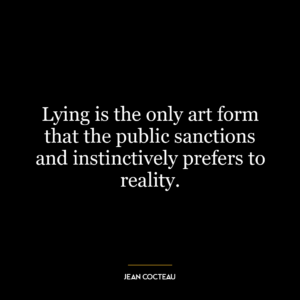This quote suggests that in order to acquire a certain quality or characteristic, you must first act as if you already possess it. This concept is related to the psychological theory of “behavioral confirmation,” which states that people’s behavior often aligns with their expectations and beliefs about themselves. If you believe and behave as though you are confident, for example, your actions will likely reflect this belief and ultimately influence how others perceive and respond to you.
In essence, Lewis is advocating for a ‘fake it till you make it’ approach. It’s not about dishonesty or pretense but more about self-belief and the power of positive thinking. By acting as if we have already achieved what we aspire to be, we start aligning our thoughts, actions, habits towards realizing that aspiration.
This idea can be applied in various aspects of personal development today. For instance, someone who wants to become a leader should start behaving like one by taking initiative, making decisions confidently, communicating effectively etc., even before they are officially given a leadership role.
Similarly in terms of emotional growth – if one wants to become more patient or empathetic they should start practicing these qualities consciously until they become inherent parts of their personality.
In the modern world where there is an increasing emphasis on personal branding especially in professional contexts – this idea can be particularly useful. By projecting confidence or expertise in a particular field (even when one might still be learning), individuals can create perceptions which might open up opportunities for growth and advancement.
However while applying this principle it’s crucial not to stray into delusion or pretentiousness – the aim isn’t just appearing but actually becoming by adopting behaviours consistently over time until they transform into intrinsic qualities.












